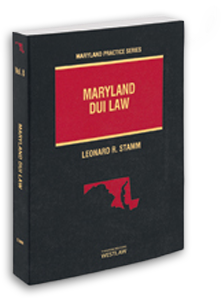(Vol. 8, Maryland Practice Series)
By: Leonard R. Stamm
MD. High Court Says License Suspension In DWI Cases Is Not Double Jeopardy
Defense Attorney Leonard Stamm in Maryland State Appeals Court in MD case of license suspension in dwi cases and double jeopardy
By Amy Argetsinger
Washington Post Staff Writer
Tuesday, October 17, 1995 ; Page D03
ANNAPOLIS, OCT. 16 — The state’s highest court today rejected the argument of Gaithersburg resident Ernest Jones, who contended that Maryland’s drunken-driving laws unfairly caused him to be punished twice.
The unanimous ruling by the Court of Appeals upheld a 1989 state law designed to get drunken drivers off the road as soon as they are charged by suspending their driver’s licenses before they go to trial.
Around the country, defense attorneys have challenged similar laws by arguing that they violate the U.S. Constitution’s ban on “double jeopardy” — prosecuting or punishing someone more than once for the same offense.
Jones’s attorney, Leonard Stamm, argued that suspending his client’s driver’s license was equivalent to a punishment. The Court of Appeals disagreed. It sided with the state Attorney General’s office that license suspension — like the process of issuing licenses — serves a “remedial” purpose of protecting the public from unsafe drivers.
The court also rejected Jones’s argument that the statute provides no basis for determining whether a person is a safe driver, or whether people charged with drunken driving are likely to do it again soon. The judges responded that the goal of the statute is merely to remove drunken drivers from the road.
Jones, a 59-year-old telecommunications engineer, was stopped by police on April 25, 1994, as he drove through a Montgomery County shopping center lot. After a breath test showed that his blood-alcohol level was almost three times the state limit for drunken driving, police charged him with driving while intoxicated.
The Motor Vehicle Administration suspended his license for 30 days. Later, he was convicted of DWI in Montgomery County District Court. However, a Circuit Court judge overturned the conviction by ruling that Jones’s right against double jeopardy had been violated.
Though many states have had license-suspension laws in place for several years, U.S. Supreme Court rulings of the past two years only recently opened the door to this kind of double-jeopardy defense.
The Court of Appeals added that “whether a sanction constitutes punishment is not to be determined from the defendant’s perspective.” Regardless of whether a defendant feels punished or inconvenienced by the loss of a license, the judges wrote, the suspension counts as a punishment only if that was the law’s intent.
Decisions similar to the one in Maryland today have come down from the highest courts of Hawaii, Maine, New Mexico and New Hampshire. Decisions are pending in Minnesota, Nebraska and Ohio. Several other states have upheld license-suspension laws or are hearing arguments on the appellate court level, according to Mothers Against Drunk Driving.
Jones’s attorney said he probably will try to appeal the case to the U.S. Supreme Court.
Articles appear as they were originally printed in The Washington Post and may not include subsequent corrections.












